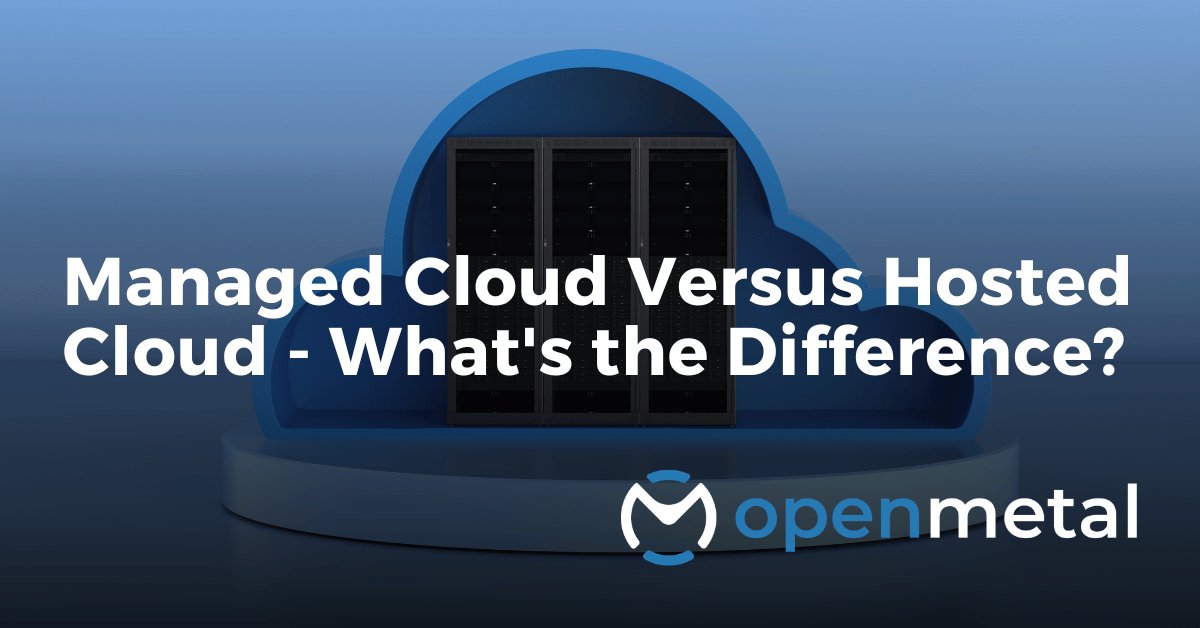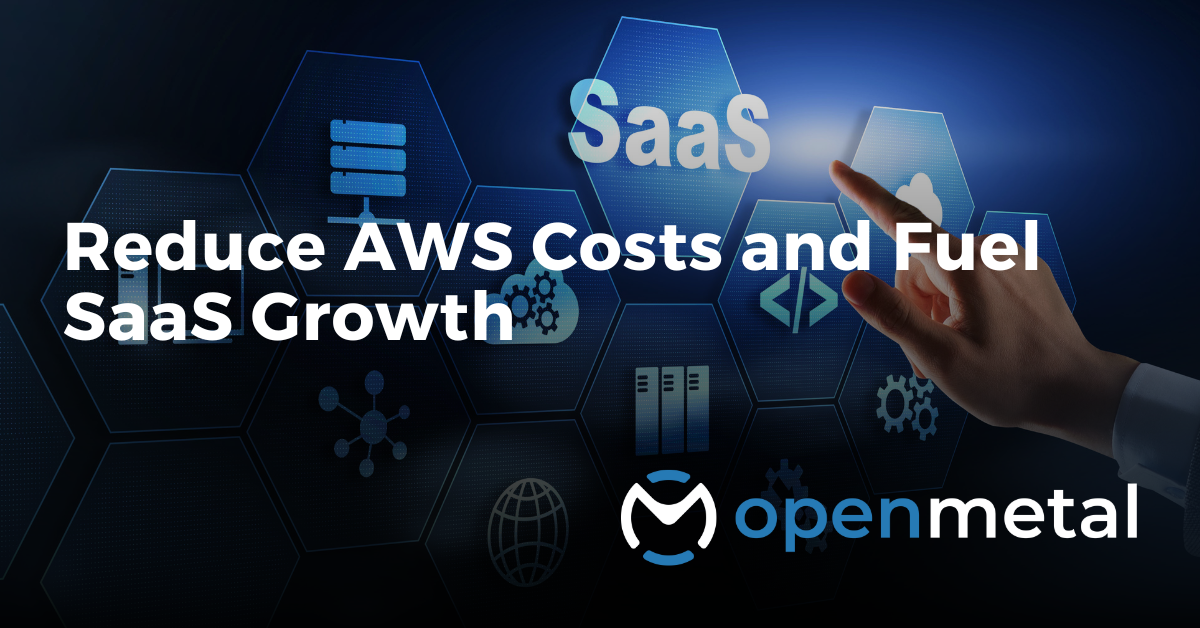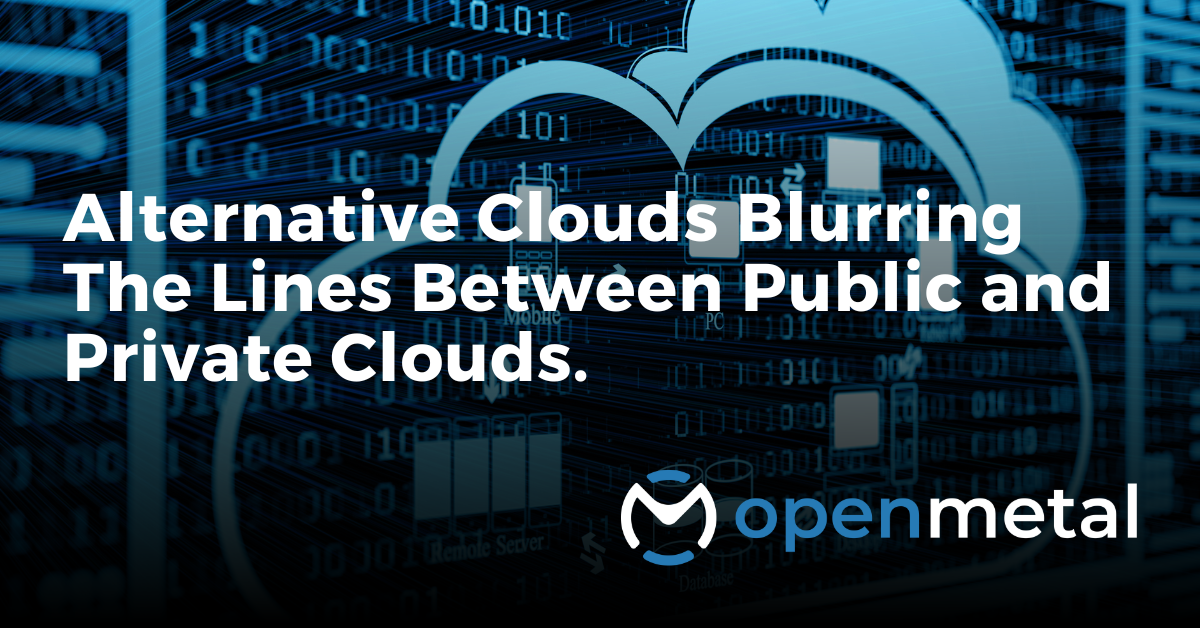The cloud has become a digital oasis, promising agility, scalability, and freedom from the shackles of on-premises infrastructure. But navigating it can be daunting, especially when faced with nearly unlimited cloud combinations – two of those being the choice between managed and hosted cloud services. Both offer the convenience of remote access and flexible resources, but beneath the surface lie distinct philosophies.
Managed cloud such as Magento cloud hosting, like a meticulous gardener, takes full responsibility for your digital garden, customizing and optimizing your environment for peak performance.
Hosted cloud like OpenMetal, on the other hand, provides a pre-built apartment within the provider’s domain, offering a quick and easy entry point that provides you more control while taking some responsibility off your hands.
Let’s delve into the differences between these two models and discover which best suits your unique needs.
Managed Cloud
A managed cloud is like having a skilled gardener tend to your virtual garden – the cloud resources you use for your IT infrastructure. Instead of you spending time and effort on tasks like setup, maintenance, and security, a managed cloud service provider takes care of it all, freeing you to focus on other priorities.
Here’s how managed cloud works:
- You choose the cloud platform: You can find managed options for just about any sort of cloud setup these days – everything from the mega public clouds to private OpenStack-powered clouds, or even a hybrid mix.
- You select the level of management you need: Some providers offer full management, taking care of everything from infrastructure to applications. Others let you manage some things yourself, like your applications, while they handle the underlying infrastructure.
- The provider takes care of the rest: This includes tasks like provisioning resources, patching software, monitoring for security threats, and responding to outages.
Benefits of using a managed cloud provider
- Saves time and money: You don’t need to hire and train or redirect your current IT staff to manage your cloud infrastructure. Managed providers are also well-versed in various technologies. They can make expert recommendations and design your infrastructure in a way that best suits your workloads, budget, and business goals. The planning and design phase of implementing cloud infrastructure can often drain weeks of valuable time and resources, so this may end up being a huge benefit for your organization. If you’re using more than one cloud platform, the right multi cloud FinOps tools can make it much easier to keep track of spending and stay on top of your budget.
- Improves performance and reliability: Managed cloud providers have the expertise and tools to keep your cloud environment running smoothly. They are constantly monitoring and optimizing your infrastructure – something an in-house IT employee may not have the resources to do.
- Enhances security: Providers have robust security measures in place to protect your data and applications. Their reputation and business depends on it!
- Provides scalability and flexibility: You can easily scale your cloud resources up or down as needed, simply by asking your provider to do so.
Things to consider
- Cost: Managed cloud services can be more expensive than managing your own cloud infrastructure. While there are certainly time and cost saving benefits versus both designing and managing your own infrastructure, you’ll want to weigh its value against the ongoing cost of a managed cloud provider.
- Vendor lock-in: You may become dependent on a particular provider, making it difficult to switch to another one if you ever want to migrate. You’ll also want to pay attention to which cloud services a provider manages. If they can’t manage or aren’t experts in a certain technology you’d like to use, you’ll have to explore additional options.
- Loss of control: While you’re able to greatly customize to your needs and preferences, you’ll inevitably give up some control over your cloud environment to the provider. This makes it extra important to thoroughly vet any potential providers. If they provide lackluster communication or SLAs, you could regret your decision down the road.
Overall, managed cloud is a great option for businesses that want to take advantage of the benefits of the cloud without the hassle of managing it themselves. It’s like having a team of experts at your disposal, helping you make the most of your cloud investment.
Hosted Cloud
A hosted cloud is akin to renting a fully furnished apartment in a shared building. The hosted cloud provider owns and manages the entire infrastructure, while you simply access and use its resources for your specific needs. Unlike a managed cloud, where you choose the platform and customize service levels, a hosted cloud offers a pre-configured environment within a specific provider’s setup.
Here’s how hosted cloud works:
- The provider sets everything up: This includes the hardware, software, operating system, and applications. You typically have limited control over this configuration.
- You access the environment remotely: You connect to the hosted cloud environment through a web browser or another remote access tool.
- You can use the provided applications and resources: These can be pre-installed software like CRM or accounting tools, storage space, and basic virtual machines.
- You pay a subscription fee: The cost is usually based on usage or a predefined package. Things like data egress may be included or billed separately.
Benefits of using a hosted cloud provider
- Quick and easy to set up: You can start using the hosted cloud services almost immediately. Some providers, like OpenMetal, offer nearly instant provisioning. Our on-demand hosted clouds deploy in under a minute!
- Low upfront costs: You don’t need to invest in your own hardware and software. Setting up your own cloud infrastructure is quite cost prohibitive for the majority of businesses. You’ll also often gain access to higher-end hardware than most organizations would ever have the funds to purchase on their own.
- Simple to manage: The provider takes care of all maintenance and updates. A hosted provider makes it simple to gain access to enterprise-level technology as they handle the purchasing, setup, management, and refreshing of all hardware.
- Accessible from anywhere: You can access your data and applications from any device with an internet connection.
Things to consider
- Limited customization: You generally have less control over the environment compared to a managed cloud. This can be challenging for businesses working in areas like custom mobile app development, where specific configurations or tools might be necessary. Like in our apartment analogy where everything is already set up and you simply choose to move in, you’re committing to use whatever the provider is offering. Some may allow additional software or customization, but be sure to clarify this before committing.
- Vendor lock-in: You may be limited to the applications and resources offered by the provider. Again, lay out what you need and your goals for your cloud environment. Make sure you’re choosing the best hosted cloud provider for those needs before committing.
- Security concerns: You need to trust the provider’s security practices. Ask for details about their environment and protections – do they operate their own data center? Do they rent out of a third-party data center? Whatever the case, ask for details and SLAs and ensure you’re confident in their security practices.
Overall, a hosted cloud is a good option for businesses that need a simple and affordable way to access cloud resources quickly and easily, especially for specific pre-packaged software solutions. However, if you don’t have the time or resources to manage your cloud’s ongoing operations yourself, or need a greater level of customization, you may want to consider a managed cloud provider.
Managed Cloud Versus Hosted Cloud – Which is the Winner for You?
In the great cloud debate, hosted and managed both offer a solid solution for different needs.
Hosted cloud offers a quick and easy entry point, like a pre-furnished rental, ideal for businesses seeking a straightforward solution with minimal fuss.
Managed cloud, on the other hand, plays the role of the dedicated gardener, meticulously tending your virtual garden, offering greater control and customization, but at a premium.
Ultimately, the best fit depends on your unique needs and priorities. If speed and simplicity are paramount, and you have the resources to manage cloud operations yourself, hosted cloud may make sense. If control and customization are your non-negotiables and you’d prefer an outside provider to help keep things working, managed cloud is a great fit.
Read More on the OpenMetal Blog
Cloud Deployment Models in 2024 – 6 Options for Modern Clouds
Cloud has matured dramatically in the last 10 years. In the beginning there were only a few cloud deployment model options. Today, in 2024, there are many easy and fast ways to get cloud.
Understanding Your Cloud Options
Is your organization prepared to harness the capabilities of cloud computing, yet unsure of where to begin? This blog will help anyone understand cloud computing and provides detailed coverage of cloud models.
Cloud Repatriation Options – On-Premise vs Colocation vs Hosted Private Cloud
More and more companies are facing the reality of high costs coming from their public cloud deployments. This has given rise to the concept of cloud repatriation.







































